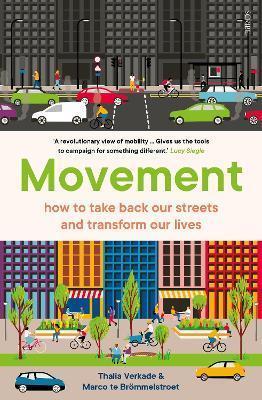Christof replied to Stephanie Jane's status
@[email protected] it's such a good one! and it's apparently based on a comment by Lewis Mumford in The New Yorker from 1955
Reader of all sorts of fiction, and non-fiction mostly about urbanism, technology, or anything else that piques my curiosity.
For non-book related tooting, you can find me at @[email protected]. And I sometimes write on my personal blog at amble.blog
Got any book recommendations?
This link opens in a pop-up window
@[email protected] it's such a good one! and it's apparently based on a comment by Lewis Mumford in The New Yorker from 1955
Adding more lanes to a motorway in order to tackle road congestion is rather like a fat man loosening his belt to combat obesity.
— Movement by Thalia Verkade (Page 71)
The world of toys reflect these changes. Lego offers a particularly clear illustration: standard Lego cars are now six studs wide, compared with just four in the 1980s. And they take up more space in Lego City. The faint cycle lane at the side of the road has vanished, while the ‘pavement’ has shrunk by two studs, or even three in some versions. The space allotted to cars has been discreetly expanded, at the expense of the rest of the miniature city.
— Movement by Thalia Verkade (Page 43)
If you want to put the area in front of a school too a different idea, you’re not just a person who wants something else, you’re someone who opposes the norm, an activist.
— Movement by Thalia Verkade (Page 41 - 42)
Marco te Brömmelstroet about the planned school drop-off zone (or as he calls it, boot-off zone) according to CROW, a Dutch traffic planning manual.
Could we get a set of traffic lights too? A zebra crossing, or give-way markings for motorists? Or perhaps a button for drivers to press - why is there no such thing?
— Movement by Thalia Verkade (Page 34)
Scattered All Over The Earth is set in a future where Japan (the land of sushi) has given way to the ocean and its rising tides. It manages to be both a story of climate refugees raising questions of national identity, as well as a poetic homage to languages. She has lived in Germany for decades and even writes in both Japanese and German, and I can’t help but imagine how her experience of coming to Germany in the 1980s has influenced this book.

Welcome to the not-too-distant future: Japan, having vanished from the face of the earth, is now remembered as “the land …
I’d heard that if you chewed rice long enough it would get sweet and turn into sake, and the same’s true for languages. And I never got a bellyache from trying to digest too much at once.
— Scattered All Over the Earth by Yoko Tawada (Page 174)

Our dependence on cars is damaging our health — and the planet’s. Movement asks radical questions about how we approach …
I stopped thinking about what would happen next. The days when you could design your future were over.
— Scattered All Over the Earth by Yoko Tawada (Page 131)
When you think about it, since we’re all earthlings, no one can be an illegal resident of earth. So why are there more and more illegal aliens every year? If things keep on this way, someday the whole human race will be illegal.
— Scattered All Over the Earth by Yoko Tawada (Page 28 - 29)

Inti Flynn arrives in Scotland with her twin sister, Aggie, to lead a team of biologists tasked with reintroducing fourteen …

The Uninhabitable Earth: Life After Warming is a 2019 book by David Wallace-Wells about the consequences of global warming. It …
If we allow global warming to proceed, and to punish us with all the ferocity we have fed it, it will be because we have chosen that punishment – collectively walking down a path of suicide.
— The Uninhabitable Earth: Life After Warming by David Wallace-Wells (Page 218)